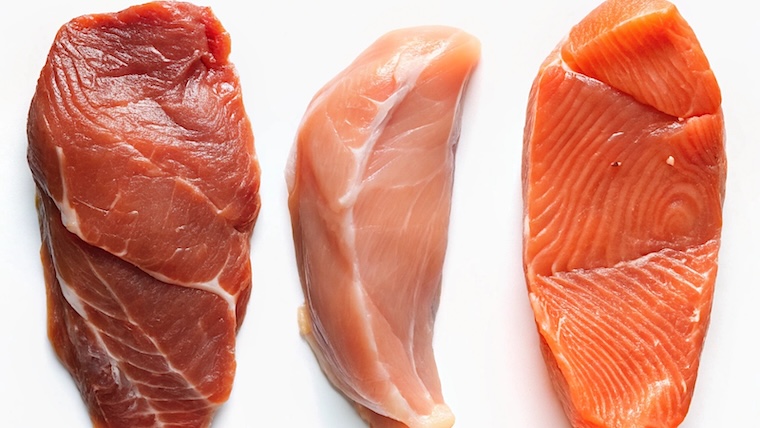Protein, a vital macronutrient composed of amino acids, plays a crucial role in muscle building, repair, maintenance, and growth. However, numerous myths persist about the relationship between increased protein intake and muscle development.
Mitchell Hooper — three-time Arnold Strongman Classic (ASC) champion, 2023 World’s Strongest Man (WSM), and the 2024 Strongest Man on Earth (SMoE) — broke down five of the most common protein misconceptions, offering insights on what to consider before adding more protein to your diet.
5 Protein Myths
Hooper consumes approximately 330 grams daily. He sometimes exceeds his daily intake to meet his nutritional needs.
I don’t find it overly difficult. I do it largely through shakes, liquid, or semi-liquid foods.
—Mitchell Hooper
Below are the five popular protein myths Hooper tackles using research:
- Anabolic Window
- Protein Powder Vs. Real Food
- Protein Consumption In One Sitting
- Effect of High Protein Diet on Kidney Function
- Women’s Protein
[Related: Nutrition and Strength Training Guidance for Trans and Nonbinary Athletes: New Study]
Anabolic Window
The protein anabolic window concept suggests that consuming protein immediately after a workout is essential to optimize muscle recovery, growth, and long-term strength gains. However, research on this topic remains inconclusive. (1)
A meta-analysis reviewed five studies that controlled for total protein intake and found mixed results: two studies indicated a timing-related benefit, while three didn’t. Of these, only two involved resistance-trained individuals, with one showing an effect and the other finding no significant impact.
Given these inconsistent findings, Hooper concluded that the timing of protein consumption should ultimately align with what is convenient for an individual’s lifestyle. Notably, the research highlights that the anabolic window remains open for at least 24 hours post-workout, regardless of when protein is consumed.
Protein Powder Vs. Real Food
Prioritize whole food over protein powder despite their similar impact on body composition. Hooper referenced a study published in the Journal of Strength and Conditioning Research, which found that consuming real food and protein powder after a workout yields similar effects on muscle performance and body composition. (2) The study reported no significant differences in strength gains between the two options.

Relying solely on protein powder or exclusively on real food can lead to micronutrient deficiencies. Hooper recommended nutrient-rich whole foods supplemented with a protein shake to boost protein intake.
Protein Consumption In One Sitting
A study published in the Journal of the International Society of Sports Nutrition explores the optimal amount of protein one can consume in a single meal to support muscle growth. (3) The study recommends consuming 0.4 grams of protein per kilogram of body weight per meal to maximize muscle-building potential.
To achieve a minimum daily protein intake of 1.6 grams per kilogram of body weight, it’s best to spread consumption across at least four meals. The upper limit for daily protein intake is 2.2 grams per kilogram of body weight. However, exceeding what your body can efficiently digest may lead to excess conversion into carbohydrates or fat — an inefficient and unnecessary process.
Effect of High-Protein Diet on Kidney Function
What happens if someone exceeds their maximum daily protein intake? Does it affect kidney health? Hooper referenced a study examining the impact of protein consumption on the renal health of individuals with no underlying conditions. (4) The findings reveal that consuming excess protein poses no risk to those with healthy kidneys. However, individuals with pre-existing health conditions should monitor their protein intake carefully.
Protein for Women
Hooper debunked the myth of women-specific protein supplements — they offer no unique benefits. Opt for a high-quality product like whey isolate — its low-calorie with a high protein concentration. Whey isolate supports lean muscle mass and aids muscle retention, particularly when in a calorie deficit.
No calorie-containing food can directly contribute to weight loss. “You either eat food, and gain weight, or you don’t eat food, and you lose weight,” Hooper stated.
References
- Schoenfeld, B. J., & Aragon, A. A. (2018). Is There a Postworkout Anabolic Window of Opportunity for Nutrient Consumption? Clearing up Controversies. The Journal of orthopaedic and sports physical therapy, 48(12), 911–914. https://doi.org/10.2519/jospt.2018.0615
- Sharp, M. H., Lowery, R. P., Shields, K. A., Lane, J. R., Gray, J. L., Partl, J. M., Hayes, D. W., Wilson, G. J., Hollmer, C. A., Minivich, J. R., & Wilson, J. M. (2018). The Effects of Beef, Chicken, or Whey Protein After Workout on Body Composition and Muscle Performance. Journal of strength and conditioning research, 32(8), 2233–2242. https://doi.org/10.1519/JSC.0000000000001936
- Schoenfeld, B. J., & Aragon, A. A. (2018). How much protein can the body use in a single meal for muscle-building? Implications for daily protein distribution. Journal of the International Society of Sports Nutrition, 15, 10. https://doi.org/10.1186/s12970-018-0215-1
Featured image via Shutterstock/Maria Alam Sraboni